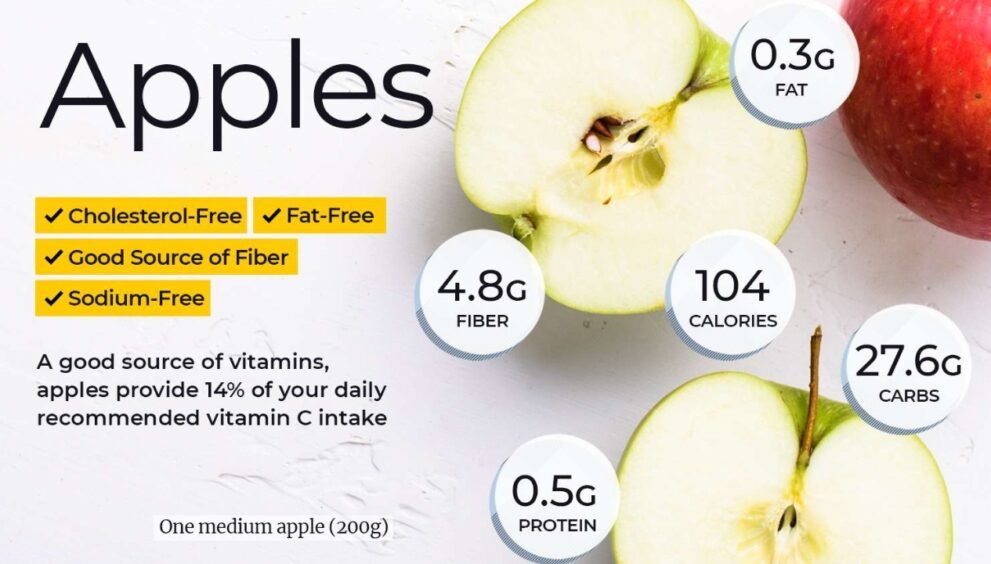Apple Protein Secrets Revealed:

Picture this: you’re biting into a crisp, juicy apple, its sweet-tart flavor bursting with every crunch. It’s a quintessentially American snack, a staple at picnics, lunchboxes, and farmers’ markets. But beyond its refreshing taste, have you ever considered the apple protein content and how this humble fruit fits into a nutritious diet? While apples are often celebrated for their fiber and antioxidants, their protein contribution is less discussed—yet equally intriguing. For Americans looking to optimize their health, understanding the full nutritional profile of apples can transform the way we view this everyday fruit. In this blog, we’ll dive into the science, debunk myths, and explore how apples can support a balanced lifestyle, drawing from expert insights and real-life perspectives shared on platforms like Reddit.
What Is Apple Protein?
When we think of protein, images of chicken breasts or protein shakes might come to mind. Apples, on the other hand, don’t scream “protein powerhouse”—but that doesn’t mean they’re nutritionally insignificant. So, what exactly is apple protein, and how does it fit into the bigger picture?
To start, apples contain a small but measurable amount of protein, roughly 0.3 to 0.5 grams per medium-sized fruit, depending on the variety. This might seem modest compared to, say, a scoop of whey protein, but it’s part of a broader nutritional package. Apples are rich in amino acids, the building blocks of protein, which play a role in tissue repair and overall body function. What makes apples unique is how their protein content works in harmony with other nutrients like fiber, vitamins, and antioxidants.
Interestingly, Reddit users in r/Nutrition often highlight apples as a go-to snack for their portability and balanced nutrients. One commenter noted, “I don’t eat apples for protein alone, but paired with peanut butter, they’re a perfect mix of carbs, fiber, and a protein boost.” This perspective underscores a key point: while apples may not be a primary protein source, their versatility makes them a valuable addition to protein-rich meals or snacks.
The Plant-Based Advantage
Moreover, the protein in apples is plant-based, which aligns with the growing trend among Americans toward sustainable and diverse diets. Whether you’re vegan, vegetarian, or simply cutting back on meat, apples offer a tiny but meaningful contribution to your daily protein needs when combined with other foods.
The Role of Apple Protein in Your Diet
Now that we’ve established what apple protein is, let’s explore why it matters. In the context of a typical American diet—often heavy in processed foods and refined sugars—apples bring a refreshing dose of whole-food nutrition. But how does their protein content contribute to overall health?
For one, protein is essential for muscle maintenance, immune function, and satiety. While apples alone won’t meet your daily protein requirements (about 46 grams for women and 56 grams for men, per USDA guidelines), they complement other protein sources beautifully. The fiber in apples—around 4 grams per fruit—slows digestion, helping you feel fuller longer when paired with protein-rich foods like nuts or yogurt. This synergy is a game-changer for busy Americans juggling work, workouts, and family life.
Nutritional Synergy
Additionally, apples are low in calories (about 95 per medium fruit) and packed with micronutrients like vitamin C and potassium. These nutrients support energy production and heart health, making apples a smart choice for anyone aiming to eat cleaner. As Dr. Lisa Young, a registered dietitian and author, explains, “Whole foods like apples provide a matrix of nutrients that work together—protein, fiber, and antioxidants create a ripple effect for better health.”
On Reddit’s r/HealthyEating, users echo this sentiment, emphasizing apples’ role in curbing cravings. One user shared, “When I’m tempted to grab chips, an apple with almond butter keeps me satisfied without the guilt.” This real-world feedback highlights how apples, with their modest protein content, can anchor healthier eating habits in a culture often dominated by convenience foods.
How to Boost Apple Protein in Your Meals
So, how can you make the most of apple protein in your daily routine? The key lies in creativity and smart pairings. Let’s dive into some practical ways to incorporate apples into a protein-packed diet without sacrificing flavor or convenience.
One of the easiest approaches is to combine apples with high-protein foods. A classic combo is apple slices with peanut butter, which delivers healthy fats, fiber, and a protein boost (about 7 grams per 2 tablespoons of peanut butter). This snack is a favorite among Redditors in r/Fitness, with one user raving, “It’s my post-workout go-to—quick, filling, and tastes like dessert.” For breakfast, try adding chopped apples to Greek yogurt or oatmeal, both of which are protein powerhouses. A cup of Greek yogurt can pack 20 grams of protein, and apples add natural sweetness and crunch.
Savory and Sweet Options
Another idea is to incorporate apples into savory dishes. Think grilled chicken salads with apple chunks or pork tenderloin with an apple-cider glaze. These recipes elevate the fruit’s subtle protein contribution while adding depth to your meals. For vegetarians, apples can enhance plant-based dishes like quinoa bowls or lentil soups, where their texture and flavor balance heartier ingredients.
Finally, don’t overlook apple-based smoothies. Blend a Granny Smith with spinach, protein powder, and almond milk for a nutrient-dense drink that’s perfect for busy mornings. The protein powder can deliver 20-30 grams per scoop, while the apple contributes fiber and antioxidants to keep you energized.
Clearing Up Apple Protein Myths
Despite their benefits, apples often face misconceptions when it comes to nutrition—especially protein. Let’s clear up a few myths to set the record straight.
First, there’s the idea that apples are “just sugar” with no real nutritional value. While apples do contain natural sugars (about 19 grams per fruit), they’re far from empty calories. Their fiber slows sugar absorption, preventing blood sugar spikes, and their protein, though small, adds to their nutrient density. Compared to processed snacks like cookies, apples are a nutritional win.
Beyond Solo Snacking
Another myth is that you need to eat apples alone to reap their benefits. In reality, pairing apples with protein or fat sources enhances their impact. As we’ve seen, Reddit users swear by combos like apples with cheese or hummus for sustained energy. This approach aligns with dietary guidelines encouraging balanced meals over single-food fixes.
Lastly, some believe apples can’t support fitness goals due to their low protein content. While they won’t replace a steak, apples provide carbs for energy and micronutrients for recovery, making them a solid choice for pre- or post-workout snacks when paired thoughtfully.
Apples: A Cultural and Nutritional Staple
Beyond nutrition, apples hold a special place in American life. From apple pie at Thanksgiving to cider at fall festivals, they’re woven into our traditions. But their role in modern wellness is just as significant. With obesity rates climbing (42% of Americans, per the CDC), whole foods like apples offer a simple way to prioritize health without overcomplicating diets.
Accessibility for All
What’s more, apples are accessible. Grown in every state, they’re affordable (about $1.50 per pound) and available year-round. Whether you’re in a rural town or a bustling city, apples are a practical choice for families, students, or anyone aiming to eat better. Their portability—no refrigeration needed—makes them ideal for on-the-go lifestyles.
Reddit’s r/BudgetFood often praises apples for their cost-effectiveness. One user shared, “I buy a bag of apples every week—they’re cheap, last forever, and work in so many recipes.” This practicality, combined with their nutritional perks, positions apples as a cornerstone of healthy eating in America.
Concluding Thoughts
As we’ve explored, apple protein might not steal the spotlight, but it’s part of what makes apples a nutritional gem. From their amino acids to their fiber and antioxidants, apples offer a holistic approach to wellness that fits seamlessly into American life. Whether you’re slicing them for a snack, tossing them into a salad, or blending them into a smoothie, apples bring balance to our plates and joy to our palates.
In a world of fad diets and quick fixes, apples remind us that health doesn’t have to be complicated. They’re proof that small, consistent choices—like reaching for a fruit over a processed snack—can ripple into lasting change. So, the next time you grab an apple, take a moment to appreciate its quiet power. It’s not just a fruit; it’s a step toward a healthier, happier you.
Hemoglobin A2 Unveiled: Why This Tiny Protein Could Save Your Life








































































































































































































































































































































































































































































































